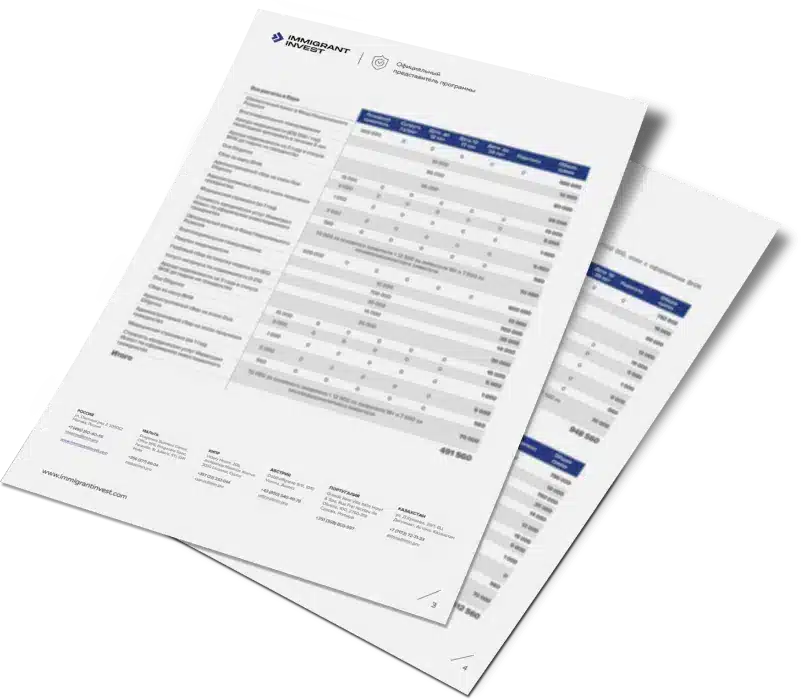Who pays taxes in St Kitts and Nevis?
Not everyone with St Kitts and Nevis citizenship needs to pay taxes in this country. It depends on whether they are a St Nevis and Kitts tax resident.
The tax resident is a person who lives in the country for more than 183 days a year, has a registered address and performs social, economic, cultural, and political activities in the country. A company is a tax resident if registered in St Kitts and Nevis or managed from there.
The non-tax resident is an individual who lives in another country even if they have St Kitts and Nevis citizenship. Companies are called non-tax residents if they are not registered or managed in St Kitts and Nevis. However, if it sells goods or offers services in the country, it is still required to pay taxes on the income earned in St Kitts and Nevis.
St Kitts and Nevis taxes for individuals
There are no income and inheritance taxes in St Kitts and Nevis for individuals, whether they are tax or non-tax residents of the country.
Withholding taxes are paid by non-tax residents of St Kitts and Nevis. The tax rate is fixed — 15% of the payments. Tax residents don’t pay withholding taxes.
Social contributions are taxes withdrawn from the salary of the person. Their rate is 5% for both tax and non-tax residents.
Stamp Duty is levied on the transfer of real property and ranges from 6% to 10%.
Unincorporated Business Tax is paid by a person or a group of persons who carry on business in St Kitts and Nevis and are nor registered under the Companies Act. The tax is 4% of sales of goods and services after granted exemption.
Taxes paid by individuals in St Kitts and Nevis
| Type of tax | Tax residents | Non-tax residents |
| Dividends | 0% | 15% |
| Royalties | 0% | 15% |
| Interests | 0% | 15% |
| Social contribution | 5% of the salary | 5% of the salary |
| Stamp Duty | 6%—10% | 6%—10% |
| Unincorporated Business Tax | 4% | 4% |
Taxes for legal entities in Saint Kitts and Nevis
The corporate tax rate in St Kitts and Nevis is 33% and is applied to the company’s net profit.
St Kitts and Nevis
St Kitts and Nevis tax residents pay corporate taxes on their global income, while non‑tax residents pay only on the income earned in St Kitts and Nevis.
The corporate tax is paid at the end of the fiscal year. The due date is 3.5 months after it. That means if your fiscal year ends on December 31st, you need to file an income tax return before April 15th of the following year.
You are subject to interest and penalties if you don't pay taxes before the due date. Interest on the late payment is 12% per year. If you file your return late, you need to pay a 5% penalty and an additional 1% for each month you don't file.
VAT. The standard VAT in St Kitts and Nevis is 17%. It is included in the prices of products. For services like hotels and restaurants, VAT is 10%.
There are also 0% taxes on goods like flour, sugar, milk, white and brown rice, oats, and bread.
Some items are tax-exempt, for example:
- insurance on vehicles, health, life, and property;
- transportation;
- education services, including tuition fees;
- interest on loans;
- electricity;
- water for domestic use;
- medical services.
There is a difference between 0% VAT goods and exempt goods. If you sell items that are taxed at 0%, you can apply for a VAT refund, which is impossible if the items are not taxed.
If you are VAT-registered, you must file a monthly VAT return before the 15th of the following month.
Withholding tax is not paid by tax residents of St Kitts and Nevis as they are counted in the company’s profit. Non-tax residents need to pay taxes on dividends, royalties and interests at a 15% rate.
Social contributions are 6% of the salary.
Taxes paid by legal entities in St Kitts and Nevis
| Type of tax | Tax residents | Non-tax residents |
| Corporate tax | 33% on the worldwide income | 33% on the income earned in St Kitts and Nevis |
| VAT | 0—15% depends on the product | 0—15% depends on the product |
| Dividends | 0% | 15% |
| Royalties | 0% | 15% |
| Interests | 0% | 15% |
| Social contribution | 6% of the salary | 6% of the salary |
St Kitts property tax
Purchase of property. Investors participating in the citizenship by investment program don’t need to pay taxes to purchase a property. Others need a licence for owning a property that costs 10% of the object’s value.
Ownership of property. The tax rate on the property depends on its use and location.
Agricultural and institutional properties are exempt from taxes on St Kitts island. However, it is not possible to just stop paying taxes on them. First, these properties must be certified by the Director of Agriculture or qualify under the Education Act.
There is also an exemption on the construction of new properties for 1 year.
Tax rates on different types of properties
| Type of property | Building or land | St Kitts | Nevis |
Accommodation | building land | 0.2% 0.2% | 0.3% 0.2% |
Agricultural | building land | 0% 0% | 0% 0.1% |
Commercial | building land | 0.3% 0.3% | 0.3% 0.2% |
Institutional | building land | 0% 0% | 0.2% 0.15% |
Residential | building land | 0.2% 0.2% | 0.156% 0.75% |
It must be paid annually before June 30th. Every property owner receives a bill by the end of May each year. Not receiving it is not an excuse not to pay taxes.
If you don’t pay your property tax by the due date, an interest of 1% per month will be added to the total amount due.
Selling of the property. If you sell a property, you need to pay a stamp duty of about 6‑10%. The tax rate depends on several factors, for example, the location. There is also no capital gain tax.
Double taxation avoidance treaties
Double taxation avoidance agreements protect companies and individuals from paying taxes at full rates in two or more countries.
St Kitts and Nevis has double taxation avoidance agreements with the countries of the Caribbean Community (CARICOM): Antigua, Belize, Dominica, Grenada, Guyana, Jamaica, Saint Lucia, St. Vincent, Trinidad & Tobago. The treaties are also signed with countries like Denmark, Norway, Sweden, San Marino, and the UK.
Benefits of St Kitts and Nevis tax system
No income tax for individuals. St Kitts and Nevis and Antigua and Barbuda are the only Caribbean countries that don’t have income taxes for individuals. Countries like Grenada, St Lucia and Dominica tax incomes at 10—35% rates depending on the earnings.
Decreased VAT for some spheres. The standard VAT is 17%, while the tourist sector is taxed at a 10% rate.
No VAT on some goods and services. There is a 0% rate on goods like flour, rice, sugar, milk, oats and bread. Some goods and services are also exempt from VAT at all. That includes insurance, water supply, electricity, educational services, and most medical services.
Low property taxes. Property tax depends on the location and the type of property. For example, residential buildings on Nevis island are taxed at a 0.156% rate, and agricultural buildings and lands on St Kitts island are exempt from property tax at all.
How to become a tax resident of St Kitts and Nevis
To become a tax resident of St Kitts and Nevis, one needs to obtain the country’s citizenship. The easiest way is to invest in the economy — then the whole process will take 4—6 months.
There are three investment options:
- non-refundable contribution — $250,000+;
- real estate purchase — $400,000+;
- Public Good Investment option — $250,000+.
Why the St Kitts and Nevis citizenship program and the country's tax system are attractive for investors
The sum of non-refundable contributions depends on the composition of the family. For example, a married couple needs to pay $250,000, while a family of four pays $300,000+.
The minimum investment in real estate is $400,000. It is made in a share of a social or infrastructure real estate project. $400,000 is an investment in a share or a whole property in a government-approved real estate project. If you decide to buy a non‑government-approved property, you need to pay $400,000.
The purchased property can be sold after 7 years.
To participate in the program, an investor needs to be over 18 years old, have no criminal records or prosecutions, no serious illnesses and with legal income that they can prove.
The investor also can add to the application their close family members. That includes a spouse of the opposite sex with no criminal records, children under 30 years old and parents over 65 years old that are fully dependent on the investor and unmarried and childless siblings under 30 years old.
Frequently asked questions
Yes, St Kitts and Nevis is a tax haven. It has no income and inheritance taxes for individuals and offers low VAT rates for some categories of goods and services.
St Kitts and Nevis has income taxes only for legal entities; individuals are exempt from them. Companies that are tax residents in St Kitts must pay taxes on their worldwide income.
The easiest way to become a tax resident in St Kitts is to obtain citizenship by investment. You need to either make a non-refundable contribution of $250,000+ or purchase real estate for at least $400,000.
Obtaining St Kitts and Nevis citizenship takes 4—6 months.
Investors can apply for citizenship themselves if they are:
- over 18 years old;
- have no criminal records or prosecutions;
- have no serious illnesses;
- have legal income and can prove it.
The investor can also add their close family members to the application: spouse, children, parents, and siblings.
There are no Caribbean islands that are completely tax-free. However, the tax system of St Kitts and Nevis is one of the most profitable among all Caribbean islands. The reason is that it doesn’t require individuals to pay income taxes at all.
Yes, there are property taxes on purchasing, selling and owning property. If you buy real estate you need to pay for the licence that costs 10% of the property’s value. However, investorы who participate in the St Kitts and Nevis citizenship by investment are exempt from this tax.
If you sell a property you need to pay a Stamp Duty at 6—10% rate. The final rate depends on the location of real estate.
The tax rate on owning the property depends on its use and location. For example, for a residential building you will need to pay 0.2% on St Kitts island and 0.156% on Nevis island.
In St Kitts and Nevis, residents enjoy a low-tax environment. There is no personal income tax, no capital gains tax, no inheritance tax, and no gift tax. The primary taxes include a property tax, which is relatively low, and a Value Added Tax (VAT) on goods and services. Property taxes are based on the value of the property and its intended use, whether residential or commercial, ensuring that the financial burden remains manageable for property owners.









